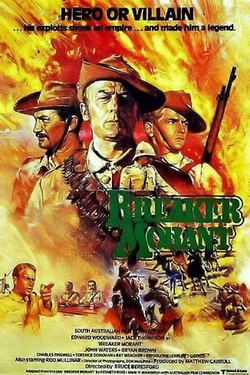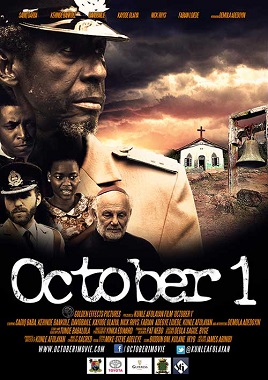
Bruce Beresford is an Australian film director and screenwriter. He has made more than 30 feature films over a 50-year career, both locally and internationally in the United States.

Breaker Morant is a 1980 Australian war drama film directed by Bruce Beresford, who co-wrote the screenplay based on Kenneth G. Ross's 1978 play of the same name.

Charade is a 1963 American romantic screwball comedy mystery film produced and directed by Stanley Donen, written by Peter Stone and Marc Behm, and starring Cary Grant and Audrey Hepburn. The cast also features Walter Matthau, James Coburn, George Kennedy, Dominique Minot, Ned Glass, and Jacques Marin. It spans three genres, suspense thriller, romance and comedy.

Lost in America is a 1985 American satirical road comedy film directed by Albert Brooks and co-written by Brooks with Monica Johnson. The film stars Brooks alongside Julie Hagerty as a married couple who decide to quit their jobs and travel across America.

Insignificance is a 1985 British alternate history drama film directed by Nicolas Roeg, and starring Gary Busey, Michael Emil, Theresa Russell, Tony Curtis, and Will Sampson. Adapted by Terry Johnson from his 1982 play of the same name, the film follows four famous characters who converge in a New York City hotel one night in 1954: Joe DiMaggio, Albert Einstein, Marilyn Monroe, and Joseph McCarthy—billed as The Ballplayer, The Professor, The Actress and The Senator, respectively.

The Innocents is a 1961 British gothic psychological horror film directed and produced by Jack Clayton, and starring Deborah Kerr, Michael Redgrave, and Megs Jenkins. Based on the 1898 novella The Turn of the Screw by the American novelist Henry James, the screenplay was adapted by William Archibald and Truman Capote, who used Archibald's own 1950 stage play—also titled The Innocents—as a primary source text. Its plot follows a governess who watches over two children and comes to fear that their large estate is haunted by ghosts and that the children are being possessed.

Police Story 2 is a 1988 Hong Kong action film starring and directed by Jackie Chan, who also wrote the screenplay with Edward Tang. It is a sequel to the hit 1985 film Police Story, continuing the storyline of Chan's character "Kevin" Chan Ka-kui, and is the second installment of Police Story series. It also marks the last appearance in the series for Lam Kwok-Hung as Chief Inspector Raymond Li, Chor Yuen as Chu Tao and Charlie Cho as John Ko.

Bad Timing is a 1980 British psychological drama film directed by Nicolas Roeg and starring Art Garfunkel, Theresa Russell, Harvey Keitel and Denholm Elliott. The plot focuses on an American woman and a psychology professor living in Vienna, and, largely told through nonlinear flashbacks, examines the details of their turbulent relationship as uncovered by a detective investigating her apparent suicide attempt.
Chief Hubert Adedeji Ogunde D.Lit. was a Nigerian actor, playwright, theatre manager, and musician who founded the first contemporary professional theatrical company in Nigeria, the African Music Research Party, in 1945.

The Contract is a 2006 German-American action thriller film directed by Bruce Beresford and written by television writer Stephen Katz and John Darrouzet. The Contract stars Morgan Freeman as professional assassin Frank Carden and John Cusack as a teacher who gets entangled into his latest assignment during a camp trip with his son. Released direct to video in the United States and Europe, The Contract received little critical notice despite its high-profile cast.

History Is Made at Night is a 1937 American romantic comedy drama film directed by Frank Borzage and starring Jean Arthur, Charles Boyer, and Colin Clive. It was distributed by United Artists. Its plot follows a woman who falls in love with a Parisian head waiter who saves her from a set-up her possessive ship magnate husband has hatched to keep her under his control.

The Great Gatsby is a 1974 American romantic drama film based on the 1925 novel of the same name by F. Scott Fitzgerald. The film was directed by Jack Clayton, produced by David Merrick, and written by Francis Ford Coppola. It stars Robert Redford, Mia Farrow, Sam Waterston, Bruce Dern, and Karen Black. The plot concerns the interactions of writer Nick Carraway with enigmatic millionaire Jay Gatsby (Redford) and Gatsby's obsession to reunite with his former lover, Daisy Buchanan (Farrow), amid the riotous parties of the Jazz Age on Long Island near New York City.

The Last American Hero is a 1973 American sports drama film based on the true story of NASCAR driver Junior Johnson. Directed by Lamont Johnson, the film stars Jeff Bridges as Junior Jackson, a character based on Johnson. It is based on Tom Wolfe's essay "The Last American Hero Is Junior Johnson. Yes!", which was first published in Esquire magazine in March 1965 and included in his debut collection of essays, The Kandy-Kolored Tangerine-Flake Streamline Baby, later that year.

A Good Man in Africa is a 1994 comedy-drama film, based on William Boyd's 1981 novel A Good Man in Africa and directed by Bruce Beresford. The film starred Colin Friels, Sean Connery, John Lithgow, Joanne Whalley, Diana Rigg and Louis Gossett Jr.
Maynard Eziashi is a Nigerian-English actor. In 1991, he won the Silver Bear for Best Actor at the 41st Berlin International Film Festival for his starring role in Mister Johnson (1990).
Mister Johnson (1939) is a novel by Joyce Cary. It is the story of a young Nigerian who falls afoul of the British colonial authorities. Although the novel has a comic tone, the story itself is tragic. Joyce Cary has been quoted as saying that Mister Johnson was his favorite book that he had written. Mister Johnson is often read in schools and has had a wide audience. It has been adapted as a play by Norman Rosten and a 1990 film by Bruce Beresford. Chinua Achebe has said that Mister Johnson struck him as superficial and helped form his determination to write his own novels about Nigeria. Other critics have found Cary's portrayal of his main character patronizing and Johnson himself childish.

The Only Son is a 1936 Japanese film directed by Yasujirō Ozu, starring Chōko Iida and Shin'ichi Himori. The film was Ozu's first sound film feature.

October 1 is a 2014 Nigerian psychological thriller film written by Tunde Babalola, produced and directed by Kunle Afolayan, and starring Sadiq Daba, Kayode Olaiya, and Demola Adedoyin. The film is set in the last months of Colonial Nigeria in 1960. It recounts the fictional story of Danladi Waziri (Daba), a police officer from Northern Nigeria investigating a series of killings of young women in the remote Western Nigeria village of Akote just before 1 October 1960 – the date Nigeria gained independence from British colonial rule.

Tunde Kelani, popularly known as TK, is a Nigerian filmmaker. In a career spanning more than four decades, TK specialises in producing movies that promote Nigeria's rich cultural heritage and have a root in documentation, archiving, education, entertainment and promotion of the culture.

Golden Age or Golden era are terms used in Nigerian film history to designate the motion picture industry of Nigeria from the late 1950s to the late 1980s. It captures the mode of visual and sound production, as well as the method of distribution employed during this period. This period began with the formal recognition of the Nigerian Film Unit as a sector in 1954, with the first film entirely copyrighted to this unit being Fincho (1957) by Sam Zebba.

















